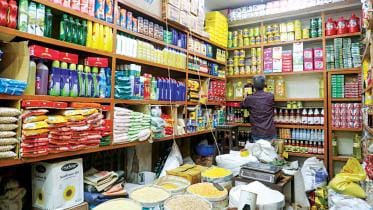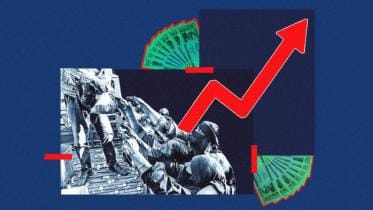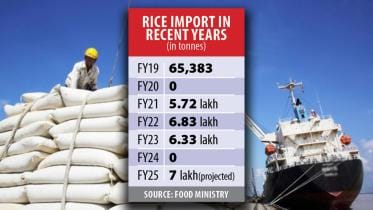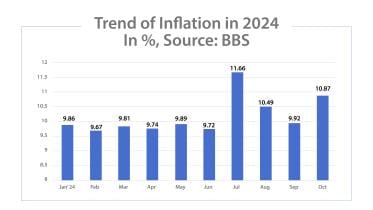Bangladesh inflation
Imported goods push up inflation in Oct-Dec
The contribution of imported goods to inflation rose in the October-December quarter of the ongoing fiscal year 2025-26 (FY26), reflecting higher prices of items brought from abroad.
16 February 2026, 00:00 AM
Stubborn and sticky: Why inflation defies monetary tightening
The Bangladesh Bank (BB) is grappling with an obstinate economic reality: inflation.
21 January 2026, 00:00 AM
Rebutting the rebuttal: On inflation, unemployment, and the Phillips curve
My article, "The interim has failed to curb inflation and unemployment," was published in The Daily Star on Dec 29, 2025. Dr Abdullah A Dewan has delivered a rebuttal to my writing, published on January 4, 2026.
8 January 2026, 07:00 AM
Inflation rises to 8.49% in December
Following months of a brief pause, inflationary pressures continued to rise in December for the second consecutive month.
5 January 2026, 18:00 PM
Bangladesh faces fiscal, inflation pressures despite stability: govt report
The report said last six months of FY25 indicate promises for rebounding economic activity
8 December 2025, 06:11 AM
Inflation eases slightly to 8.29% in August
The decline was mainly driven by a notable fall in non-food inflation
7 September 2025, 08:34 AM
Rice prices remain key driver of inflation: GED report
Rice prices remain a major concern for food inflation as well as overall inflation, according to a report by the General Economics Division (GED) of the Bangladesh Planning Commission.
17 August 2025, 20:25 PM
Can monetary policy rescue the economy?
The question remains whether this policy can rescue the economy from the doldrums and place it firmly on the path of vibrancy.
17 August 2025, 02:00 AM
How inflation control correlates with economic growth
The slide in GDP growth is a complex interaction of a whole host of factors.
16 August 2025, 02:00 AM
Inflation inches up in July, driven by food prices
Inflation edged up in July on declining in the preceding three months, driven primarily by rising food prices, according to government data, renewing concerns over mounting pressure on consumers amid persistent supply side challenges.
7 August 2025, 18:01 PM
Inflation falls to three-year low
Consumer prices eased to their lowest level in nearly three years in June, according to official data, offering tentative signs of economic stabilisation after months of monetary tightening by the central bank.
7 July 2025, 18:00 PM
BB eyes rate cut to 7% if inflation slows to 5% by March
The Bangladesh Bank will consider slashing the policy rate to 7 percent by March, provided that rampant inflation, which has hovered above 9 percent for nearly two years, eases to 5 percent by then, Governor Ahsan H Mansur said yesterday.
3 May 2025, 18:00 PM
In Bangladesh, inflation control needs an iconoclastic approach
Bangladesh inflation soared (5.86 percent to 11.38 percent in 2022-2024), driven by global shocks and food prices.
4 March 2025, 10:00 AM
Ensuring economic stability is paramount
Govt must rein in inflation, adopt more business-friendly policies
20 February 2025, 05:00 AM
Key governance reforms needed for a fairer Bangladesh
While stabilising the economy is a priority, the roots of Bangladesh’s recent turmoil lie in a crisis of governance.
18 February 2025, 06:20 AM
Rice imports to hit seven-year high
The interim government is set to import seven lakh tonnes of rice, the highest in the last seven fiscal years, as it looks to shore up its depleting food grain stock and ease the cost of living crisis for the low- and fixed-income people battered by the prolonged high inflation.
17 January 2025, 18:08 PM
Inflation eases in December but stays over 10%
Arrival of winter vegetables contributes to the decline
6 January 2025, 05:41 AM
Inflation outpaces wage growth for 34 months straight
Many low-income and unskilled workers in Bangladesh’s agriculture, industrial and service sectors are being compelled to reduce consumption as rising inflation eroded their real incomes over the past three years.
28 December 2024, 18:00 PM
Inflation high as oligarchic grip still haunts economy
Even after the political changeover in early August, the domestic market has been reeling under the influence of oligarchs, according to economist Hossain Zillur Rahman.
21 December 2024, 18:00 PM
Inflation rises to 10.87 percent in October from 9.92 percent in September
Inflation rises to 10.87 percent in October from 9.92 percent in September
7 November 2024, 10:25 AM






















